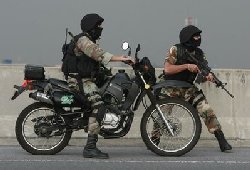One soldier has reportedly been killed and several people have been injured in fierce clashes between security forces and anti-government red shirt protesters in the Thai capital, Bangkok.
The clashes on Wednesday came after police and soldiers opened fire with rubber bullets and live ammunition in an attempt to halt a convoy of red shirts headed for a rally on the outskirts of Bangkok.
The confrontation on a main highway in the north of the capital came as the red shirts defied government warnings not to try and escalate their protests out of the centre of the city.
Sansern Kaewkamnerd, a spokesman for the Thai army, said troops were told to use rubber bullets but had the authority to use live ammunition if needed for self-defense.
"At this point, there is too much chaos for anybody to constantly report what kind bullets they are using," he said.
"We brought force out to stop them. At this point, society finds it unacceptable to have protesters travelling in a motorcade like this," Sansern told reporters. ``We try our best to prevent losses.''
The clashes broke out after a large crowd of red shirts charged at a razor-wire barricade set up across the highway and backed up by hundreds of security personnel.
Earlier an initial volley of warning shots had appeared to convince the protesters to retreat, but they then regrouped before charging at the barricade once again.
Witnesses said dozens of red shirt protesters - some of them apparently also armed and returning fire - moved ahead of the main convoy, clashing with troops and riot police who used batons and shields to push them back.
Some reports said red shirt leaders had urged the protesters to pull back and return to central Bangkok.
Vowing to test the government's will, thousands of singing and chanting red shirt supporters had earlier joined a convoy of pickup trucks and motorbikes headed to a rally at an outdoor market in Rangsit, north of the Thai capital, aiming to drum up support for their protests.
'Not afraid'
Al Jazeera's Wayne Hay, reporting from the scene, said the red shirts had called the rally in an effort to turn up the heat on the government after seven weeks of protests.
Red shirt leaders had challenged authorities to stop the convoy following warnings from officials that they would not tolerate moves to spread the protests beyond central Bangkok.
"We are going to send (protesters) out of the rally site," Nattawut Saikua, a red shirt leader, told the Associated Press news agency, as the convoy left central Bangkok earlier on Wednesday.
"If the military thinks it is necessary to use force to block us, it's all right… We are not afraid."
The confrontation has raised fears of further bloody clashes between the red shirts and Thai security forces following government warnings that it was running out of patience after seven straight weeks of protests.
Earlier this month 25 people were killed and more than 800 people were wounded as heavily armed police and troops tried to clear protesters from a camp in central Bangkok.
The protests began in mid-March bringing large parts of central Bangkok to a standstill and causing thousands of tourists to cancel visits to Thailand, badly denting the country's vital tourism industry.
Coup
The red shirts consist mainly of poor, rural supporters of former prime minister Thaksin Shinawatra and pro-democracy activists who opposed the military coup that ousted him in 2006.
They believe that the government of the current prime minister, Abhisit Vejjajiva, is illegitimate having come to power in a parliamentary vote after a court ruling dissolved the previous pro-Thaksin government.
The conflict has been characterized by some as class warfare, and a pro-government group known as the yellow shirts have demanded that authorities crack down on the demonstrators.
On Monday leaders of the yellow shirts threatened they would take direct action themselves to "protect the country" if authorities do not deal with the red shirts.
PHOTO CAPTION
Two Thai soldiers react during clashes with anti-government protesters on the outskirts of Bangkok, Thailand Wednesday, April 28, 2010.
Al-Jazeera


 Home
Home Discover Islam
Discover Islam Quran Recitations
Quran Recitations Lectures
Lectures
 Fatwa
Fatwa Articles
Articles Fiqh
Fiqh E-Books
E-Books Boys & Girls
Boys & Girls  Ramadan
Ramadan Fatwa Audios
Fatwa Audios Month of Mercy
Month of Mercy Women
Women Eed Al- Fitr
Eed Al- Fitr Food Recipes
Food Recipes Videos
Videos

 Prayer Times
Prayer Times












